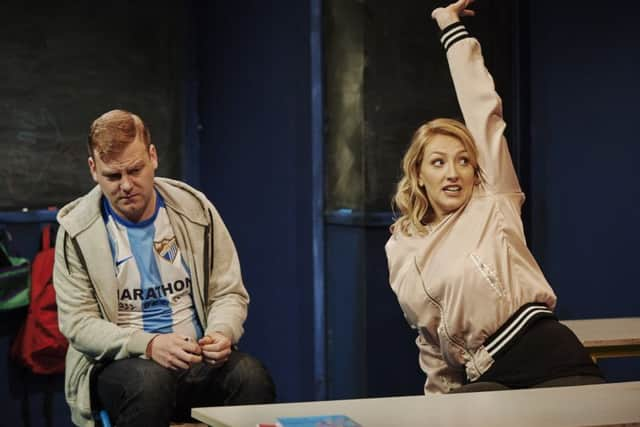Theatre reviews: Ulster American | Class | Daughter | Coriolanus Vanishes | Alma, A Human Voice


Ulster American, Traverse Theatre (Venue 15) ****
Class, Traverse Theatre (Venue 15) ****
Daughter, Canada Hub @ King’s Hall (Venue 73) ***


Coriolanus Vanishes, Traverse Theatre (Venue 15) ****
Alma, A Human Voice, Summerhall (Venue 26), ***
So far, on the Edinburgh Fringe of 2018, the dominant sound is that of men coming to terms with the #MeToo moment, and with the apparent revelation that given the power, most men tend to behave like sexual predators and absolute bastards.
Whether this is true remains debatable. While the accusation hangs in the air, though, male theatre-makers in droves seem to be getting down to the business of boasting, apologising, breast-beating, agonising, and once again claiming most of our attention; and none of them roars more loudly than the brilliant Northern Irish playwright David Ireland, whose new play Ulster American explodes on to the stage of the Traverse with all the force of an ill-tempered but wickedly witty hurricane.
Advertisement
Hide AdAdvertisement
Hide AdThe scenario is simple, and – in a move always popular on the Fringe – focused on the world of theatre itself. In a flat in London, a would-be-liberal theatre director, and famous Hollywood actor who fancies himself “one of the nicest guys in the business,” confront Ruth, a young woman writer from Northern Ireland whose play – featuring a fierce Ulster Loyalist hero – neither of them has read with much respect or real comprehension; and in a 75-minute drama of blistering pace and intensity – delivered with eye-popping force by Robert Jack, Darrell D’Silva and Lucianne McEvoy, in Gareth Nicholls’s memorable production – the three almost literally tear chunks out of one another, through an increasingly bloody welter of gender and identity politics.
The play’s problem is that beneath the sound and fury, it has not much to say beyond the fashionable idea – increasingly complicit with far-right thinking – that people with liberal views are all hypocrites and moral weaklings, whereas bigotry, intolerance and violence are marks of authenticity. These are, though, the times we live in and no writer conjures that zeitgeist with more theatrical nerve than David Ireland.
If Ulster American offers the pleasingly lurid spectacle of dysfunctional masculinity meeting its ruthless female match, Iseult Golden and David Horan’s Class offers a vastly more humane and realistic view of the same issues, as working-class parents Brian and Donna roll up at school to talk to the teacher, Mr McCafferty, about their nine-year-old son Jayden, who seems to be having learning difficulties.
Donna and Brian are no longer living together, and it soon becomes clear that this has something to do with Brian’s hair-trigger aggressive touchiness; the male teacher, meanwhile, is a classic liberal type, who – it soon emerges – has his own issues with marriage and masculinity.
Out of this outwardly simple situation, Golden and Horan weave a passionate 21st-century tragedy about a man trapped by a lifetime of economic and class humiliation, unable to deal with his own anger; and the whole brief drama, brilliantly performed by Sarah Morris, Will O’Connell, and a superb Stephen Jones – as both the broken Brian and wee Jayden – burns itself on the mind as an utterly credible, humorous yet heartbroken snapshot of a western culture in which, for some men, issues of gender, class and power can now form an utterly toxic mix of rage, resentment and desperation.
It’s difficult, though, to imagine a play about dysfunctional male attitudes more likely to set teeth on edge, and to provoke heated discussion on this year’s Fringe, than Adam Lazarus’s Daughter, at the Canada Hub, a solo show in which Lazarus creates the character of a truly repellent man of our time, a middle-class theatre artist living in Toronto with his wife and two young children, who treats us to a detailed account of just how false his mask of doting husband and father really is.
Advertisement
Hide AdAdvertisement
Hide AdLazarus’s technique is to try to make his audience complicit with his journey from a weird childhood, through a porn-and-prostitution soaked young adulthood, to compulsive marital infidelity, the more to shock us, towards the end, with the underlying misogynistic violence of his attitudes; he constantly appeals to us with asides like: “We’ve all done that, right?”
If you haven’t done any of that you will find Lazarus’s character self-obsessed, a shade predictable, and obviously suspect from the outset. If you have, though – and we do live in a culture drenched in misogynistic pornography – then you may find this show a powerful provocation, in its final assertion that this “new normal” is increasingly unacceptable, and very far from harmless.
After all of which there’s a sense of relief in encountering the work of male theatre makers who clearly and lucidly reject the world of patriarchal values and general machismo. David Leddy’s fine monologue Coriolanus Vanishes, first performed in Glasgow last year by Leddy himself, deftly and exquisitely takes apart – through a series of traumatic bereavements – the arid life of a successful arms-industry dealer who is bisexual, faithless, and a poor parent to a recently adopted little son; although there’s no pretending that Irene Allen’s impressive and moving performance, this time round, can quite match the visceral power of the image of a big, forceful man in a suit experiencing the full disintegration of that outwardly successful self.
And meanwhile at Summerhall, Lorenzo Piccolo of the Milan-based company Nina’s Drag Queens offers eloquent images of a male figure in full flight from stereotyped masculinity in Alma, A Human Voice, in which the solo performer identifies intensely both with Alma Mahler, and in particular with the moment when her rejected lover Oskar Kokoschka tries to re-create her as a life-sized doll, and with the lone, rejected heroine of Jean Cocteau’s 1930 monologue La Voix Humaine. It can’t be said that this highly stylised re-run of iconic moments of female sensibility and male abuse achieves a great deal; but it is visually vivid, and full of a profound sense of escape from the bonds of a kind of masculinity that prefers to feel nothing rather than risk the pain of Cocteau’s heroine, and that believes a living, breathing woman can somehow be replaced by a doll.
• Ulster American until 26 August, tomorrow 9pm. Class until 26 August, tomorrow 6:15pm. Daughter until 26 August, Wednesday 12:30pm. Coriolanus Vanishes until 26 August, tomorrow 3:45pm. Alma, A Human Voice until 26 August, today 11:50am.